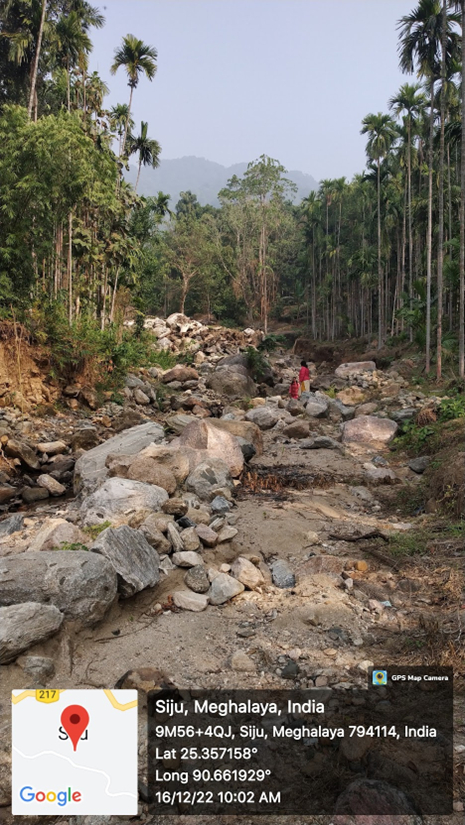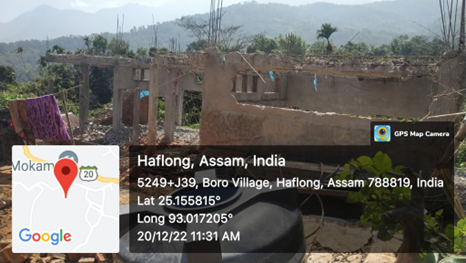Amrita Vishwa Vidyapeetham has been closely working with local and state governments since 2009 in landslide early warning in Munnar, Kerala and Chandmari, Sikkim, India.
Amrita Vishwa Vidyapeetham has developed and deployed a wireless sensor network for landslide detection at Anthoniar Colony, Munnar, Idukki. This system consisting of more than 100 geological sensors and more than 6 wireless sensor nodes at six different locations is monitoring the deployment site, collecting, and transmitting data 24 x 7 and has been functional since 2009. On 5th July 2023 the system detected a possibility of landslide at a regional scale and Amrita University researchers verified and issued the warning generated by the system to the state government via email. The screenshot of the warning letter given to state govt along with the news report on the following regional level landslides that occurred after the warning is given below:-
The Memorandum of Understanding (MoU) between Amrita Vishwa Vidyapeetham and the Karnataka State Natural Disaster Monitoring Centre (KSNDMC) was established in Dec 2022 to promote collaborative efforts in landslide risk reduction, with a key focus on the development and deployment of a Landslide Early Warning System (LEWS) in Karnataka.
As part of this initiative, scientists from Amrita Vishwa Vidyapeetham have commenced work in the Kodagu district of Karnataka, laying the groundwork as part of the MoU. For reference, we have included a copy of the MoU’s cover page and a photograph showcasing Amrita University scientists collaborating with Karnataka government staff during a fieldwork in Kodagu District.



Amrita Vishwa Vidyapeetham has been conferred the title of “World Centre of Excellence on Landslide Risk Reduction (WCoEs)” for the third consecutive term by the International Programme on Landslides (IPL) at the 6th World Landslide Forum in Florence, Italy, held from November 14 to 17, 2023. Additionally, the university received the prestigious International Program on Landslides, Kyoto Landslide Consortium (IPL-KLC) Award for Success in recognition of its outstanding contributions to landslide research. The WCoE title will be held by Amrita until 2026. A picture of Amrita University’s Provost receiving this award at Florence, Italy given below for reference.

The Averted Disaster Award (ADA) names the Amrita Center for Wireless Networks and Applications as the winner of the 2023 ADA award for outstanding Disaster Risk Management (DRM) intervention
This prestigious recognition was announced at the 11th Global Dialogue Platform on Anticipatory Humanitarian Action on Oct 12, 2023 in Berlin, during a three-day conference. Created in December 2021, the Averted Disaster Award is an annual competition that seeks to bring visibility to successful Disaster Risk Management programs and policies around the world.
Shanna McClain, Disasters Program Manager at NASA, ADA Selection Committee Member and host of the award ceremony said, “Amrita’s collaborative approach bringing together scientists and the community is an example of best practice in developing effective disaster risk technology.” McClain added, “When at-risk communities are engaged as implementing partners from the outset, they are more likely to follow emergency guidance and develop long-term community resilience.”


Amrita Vishwa Vidyapeetham has partnered with the India Meteorological Department (IMD) to enhance dynamic multi-hazard risk modeling and develop rainfall threshold-based early warning systems for landslides. Through this collaboration, Amrita receives comprehensive meteorological data—including rainfall and temperature readings—from IMD’s extensive network of stations across India. This data is integral to Amrita’s innovative Landslide Early Warning System (LEWS), which employs real-time monitoring of rainfall, soil moisture, pore-water pressure, and other geophysical parameters to predict landslide occurrences. By integrating IMD’s meteorological data with LEWS, Amrita aims to provide timely and accurate alerts, thereby mitigating disaster risks and enhancing community resilience.
Dr. Maneesha and her team were extended an invitation to visit the northeastern states of India, including Arunachal Pradesh, Sikkim, Meghalaya, and Assam. The purpose of this visit was to conduct an in-depth study of regions severely affected by landslides. Their mission focused on analyzing the characteristics, causes, and impacts of various types of landslides that lead to such widespread devastation in these areas. This comprehensive study aims to understand the intricate geological, environmental, and climatic factors contributing to these events, ultimately paving the way for improved disaster preparedness and mitigation strategies.







Based on initiatives under Amrita Vishwa Vidyapeetham’s World Center of Excellence on Landslide Risk Reduction, a team of six researchers from the Amrita Center on Wireless Networks and Applications visited Joshimath, Uttarakhand, in November 2022. Led by Prof. Maneesha V. Ramesh, Provost of Strategic Initiatives and Research, AI+X, the team aimed to study the extent of damage caused by landslides and land subsidence, as well as the community’s resilience in coping with these hazards.
Field investigations were conducted in Sunil village, Gandhi Nagar, and upper and lower Bazar. Crack measurements and semi-structured interviews revealed that residents live in constant fear of their homes collapsing, with some walls entirely destroyed. Coping mechanisms include applying cement to cracks and avoiding heavily damaged rooms. Many daily wage workers cannot afford alternative accommodations, and some have petitioned for permanent relocation.
Joshimath, a geologically fragile town near the Dhauliganga and Alaknanda rivers, faces increased land subsidence due to unplanned development, road widening, seismic activity, and inadequate ground assessments. Although residents suspect nearby hydro-power tunnels, no direct link has been found. Geological factors, including weathered rocks and tectonic activity along the Main Central Thrust (MCT), are primary contributors. Further studies supported by the Uttarakhand State Disaster Management Authority are underway to address these challenges.
The inherent coping capacity of the community members is hindered due to high exposure to hazards as a result of the nature of the terrain. The lower valleys are interspersed with rivers and the higher elevation contain steep slopes with snow cover. They are often plagued by disasters which have drastically increased in recent times. Furthermore, These villages are densely populated. Most residents are of low socio-economic backgrounds. The team observed cracks in almost every house visited and there are signs of subsidence on the roads.
The team provided expert analysis to the Uttarakhand State Disaster Management Authority. Further detailed investigations and analysis are to follow particularly in the areas of pore-pressure conditions, the thickness of soils, detained tectonic features and water supply and discharge. This will be done in collaboration with the Uttarakhand State Disaster Management Authority, which extended full cooperation and logistic support to the visiting team.





Amrita plays a pioneering role in shaping policy recommendations for Civil 20 India 2023 India Working Group on Sustainable and Resilient Communities – Climate, Environment and Net Zero Targets
Amrita hosted the Civil 20 India Working Group on Sustainable and Resilient Communities – Climate, Environment and Net Zero Targets in 2023. The Working group engaged with 1000+ Civil Society Organizations and Individuals 100+ meetings that included Policy Dialogues, Chaupal, and Jan Bhagidari events. This has led to shaping the policy recommendations on key areas such as Climate Resilience and Social Justice, Environmental Sustainability, Net Zero Emission Management and Compassion Driven Approaches to Sustainable and Resilient Communities.
The policy by Civil 20 India on Climate, Environment and Net Zero Targets to the G20 includes several cross cutting recommendations. Some of the key recommendations to G20 include
Our university has received notable recognition for its extensive work in landslide research, with Dr. Maneesha V. Ramesh, Director and Professor at the Amrita Center for Wireless Networks & Applications, continuing in her role as the Advisory Committee Member on Landslides and Debris Flow for the Kerala State Disaster Management Authority as per the govt order on GO (Rt) No. 356/2020/DMD dated 17-3-2020. This five-member committee is tasked with supporting the authority in mitigating landslide risks across Kerala. As an integral part of the committee, we will contribute by assisting in the development of specific landslide preparedness and prevention plans, conducting site visits and studies at landslide and quarry locations to ensure compliance with safety guidelines, and preparing detailed mitigation plans to secure funding from the Central Government. Our involvement reflects a continued commitment to leveraging research for the safety and resilience of communities in landslide-prone areas.

